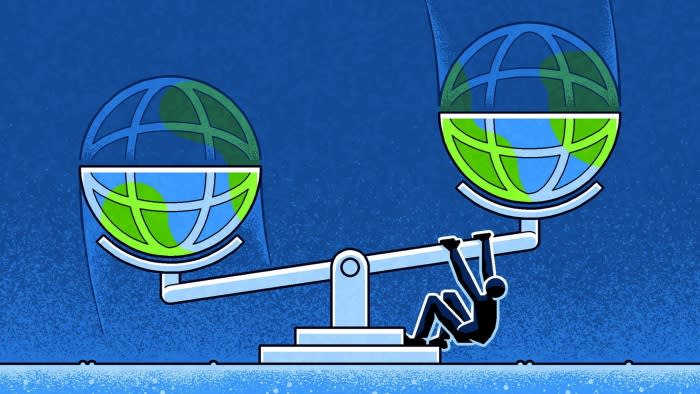John Maynard Keynes saw today’s trade troubles coming. Back in 1944 at Bretton Woods, he advocated a global trading system that would target persistent imbalances between surplus and deficit countries, rather than policing one-off trade violations. Too bad that’s not what we got.
As the World Trade Organization’s 13th ministerial meeting starts on Monday, I suspect the conversation around trade will continue to be small and technocratic. This misses the core problem, which is that the long-term imbalances between the deficit countries and the surplus nations have created unsustainable economics and politics around the world.
Fixing this requires more than incremental tweaks; it calls for a radical reorganisation of the global trading system. Carnegie Endowment senior fellow and economist Michael Pettis argues for this in a new paper that builds on the ideas in his co-authored 2020 book Trade Wars Are Class Wars.
Deficit countries, particularly the US but also the UK, Australia and Canada, have had no choice but to balance out the loss of manufacturing jobs with excess debt, resulting in more fragile, financialised economies.
The surplus countries, meanwhile — most notably China, but also Taiwan, South Korea and Germany — get jobs but remain stuck with weak domestic demand because households are directly or indirectly subsidising manufacturing.
In order to accept that persistent imbalances are actually a problem (rather than a natural evolution as advanced economies move away from manufacturing) we need to reconsider some entrenched views about trade.
For starters, 19th-century British economist David Ricardo, who first put forth the idea of “comparative advantage”, never imagined a world in which subsidised manufacturing by foreign states would leave domestic consumers unable to absorb domestic production. For him, comparative advantage meant trading cloth for wine — not ditching the industrial commons.
Economists may infer from Ricardo that the US or parts of Europe simply have a comparative disadvantage in manufacturing, while parts of Asia have an advantage. But that fundamentally misunderstands the concept. Nineteenth-century comparative advantage wasn’t based on an industrial policy that transferred money globally from consumers to producers. Exports were meant to maximise the value of imports — not, as Pettis puts it, “externalise the consequences of suppressed domestic demand”.
Likewise, while many mainstream economists assume that foreign money flowing into US dollars should both lower American interest rates and finance American investment, this hasn’t been the case for decades. That’s because it’s flowing into countries where business investment has been constrained by demand. Consider, says Pettis, that much of the foreign money flowing into the US goes into the assets of multinational companies that park that cash rather than invest it.
You could, of course, bump up domestic demand with an industrial policy that incentivises certain industries — such as manufacturing. That’s what President Joe Biden’s administration is doing right now. You could also make cheap imports more expensive, as Donald Trump would probably do with much higher tariffs, if he won a second term.
But neither of those solutions are optimal, in part because they force each country to go it alone. A more effective plan would involve the major deficit countries coming together to force surplus nations to stop imposing their economic choices on the rest of the world.
That would probably mean a joint approach to tariffs, capital controls and friendshoring, so no one has to rebuild the entire industrial commons alone.
So far, so Panglossian. But the alternative is that the US continues to take a unilateral approach to rejiggering the global trade system. We’ve seen how action around Chinese steel and aluminium dumping has morphed into worries about critical minerals, electric vehicles and more recently transport and logistics, which brings into question not only unfair trade practices but also worries about the security of ports and other critical infrastructure.
The Biden administration last week poured billions of dollars into domestic manufacturing of cargo cranes, to counter fears of hackers exploiting software in Chinese cranes. While Chinese officials have called the concerns “entirely paranoia”, it’s worth noting that many of the world’s ports, freight carriers and forwarders, as well as some terminals in the US, use a Chinese logistics platform called LOGINK, the making of which was subsidised by Beijing and is provided free of charge in order to encourage its global use.
As a 2022 US-China Economic and Security Review Commission report put it, the platform allows Beijing access to “sensitive data, including commercial transport of US military cargo, insight into supply chain vulnerabilities, and critical market information. All this could help Chinese firms compete on unequal footing in the nearly $1tn third-party logistics industry.”
If you thought that trade strife in physical goods was disruptive, consider what happens when you add in concern about Beijing’s subsidies allowing the Chinese Communist party to monitor global shipping. I’m guessing topics like this, and the systemic problems that cause them, won’t be top of the agenda at the WTO. They should be.
rana.foroohar@ft.com
Also Read More: World News | Entertainment News | Celebrity News







